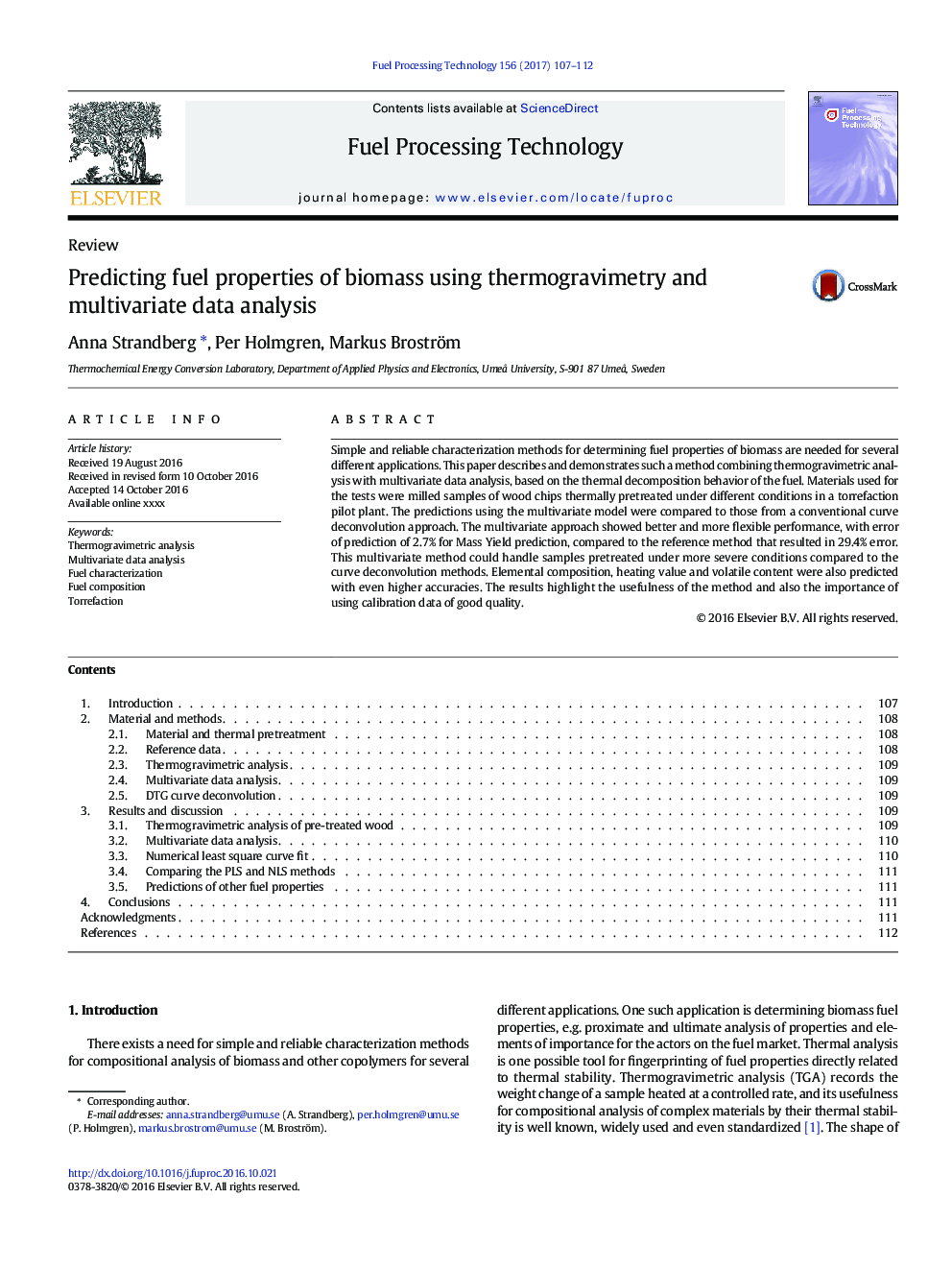| کد مقاله | کد نشریه | سال انتشار | مقاله انگلیسی | نسخه تمام متن |
|---|---|---|---|---|
| 6476603 | 1425390 | 2017 | 6 صفحه PDF | دانلود رایگان |
عنوان انگلیسی مقاله ISI
Predicting fuel properties of biomass using thermogravimetry and multivariate data analysis
ترجمه فارسی عنوان
پیش بینی خواص سوخت زیست توده با استفاده از ترموگرافیمری و تجزیه و تحلیل داده های چند متغیره
دانلود مقاله + سفارش ترجمه
دانلود مقاله ISI انگلیسی
رایگان برای ایرانیان
کلمات کلیدی
تجزیه و تحلیل ترموگرافی، تجزیه و تحلیل داده های چند متغیره، مشخصه سوخت، ترکیب سوخت، تورفتگی،
ترجمه چکیده
روش های مختلفی برای تعیین خواص سوختی زیست توده برای تعیین چندین کاربردهای مختلف مورد نیاز است. این مقاله توصیف و نشان می دهد چنین روش هایی را با ترکیب تجزیه و تحلیل گرماسنجی با تجزیه و تحلیل داده های چند متغیره، بر اساس رفتار تجزیه حرارتی سوخت. مواد مورد استفاده برای آزمایش، نمونه های خرد شده تراشه های چوبی بود که تحت شرایط مختلف در یک کارخانه خلع سلاح خنثی سازی شدند. پیش بینی ها با استفاده از مدل چند متغیره با آنهایی که از یک روش تقسیم بندی منحنی معمول استفاده می شود مقایسه شدند. رویکرد چند متغیره عملکرد بهتر و انعطاف پذیری را نشان می دهد، با خطای پیش بینی 7/2٪ برای پیش بینی عملکرد توده، نسبت به روش مرجع که خطا 29،4٪ را نشان می دهد. این روش چند متغیره می تواند نمونه هایی را که پیش از مداخله در شرایط سخت تر نسبت به روش های انحرافی منحصر به فرد استفاده می شود، اداره کند. ترکیب عنصری، ارزش گرمایی و محتوای فرار، با دقت بیشتری نیز پیش بینی شده است. نتایج نتایج استفاده از روش و همچنین اهمیت استفاده از داده های کالیبراسیون از کیفیت خوب را برجسته می کند.
موضوعات مرتبط
مهندسی و علوم پایه
مهندسی شیمی
مهندسی شیمی (عمومی)
چکیده انگلیسی
Simple and reliable characterization methods for determining fuel properties of biomass are needed for several different applications. This paper describes and demonstrates such a method combining thermogravimetric analysis with multivariate data analysis, based on the thermal decomposition behavior of the fuel. Materials used for the tests were milled samples of wood chips thermally pretreated under different conditions in a torrefaction pilot plant. The predictions using the multivariate model were compared to those from a conventional curve deconvolution approach. The multivariate approach showed better and more flexible performance, with error of prediction of 2.7% for Mass Yield prediction, compared to the reference method that resulted in 29.4% error. This multivariate method could handle samples pretreated under more severe conditions compared to the curve deconvolution methods. Elemental composition, heating value and volatile content were also predicted with even higher accuracies. The results highlight the usefulness of the method and also the importance of using calibration data of good quality.
ناشر
Database: Elsevier - ScienceDirect (ساینس دایرکت)
Journal: Fuel Processing Technology - Volume 156, February 2017, Pages 107-112
Journal: Fuel Processing Technology - Volume 156, February 2017, Pages 107-112
نویسندگان
Anna Strandberg, Per Holmgren, Markus Broström,
